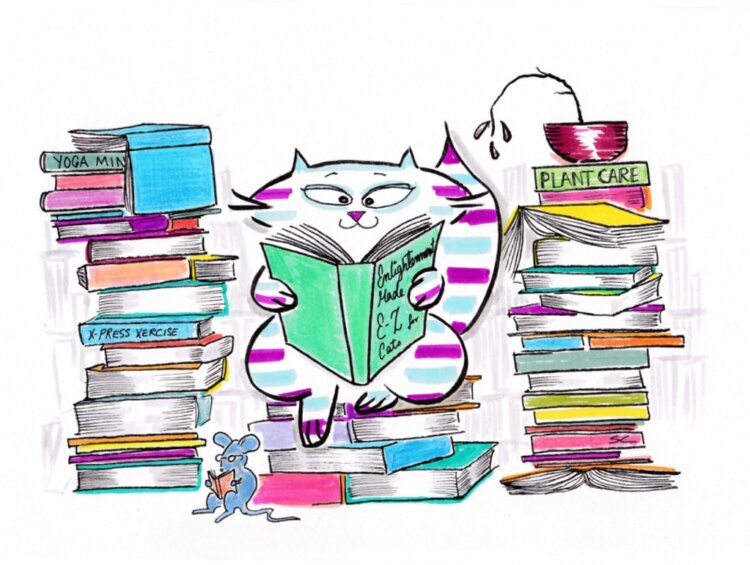
Hey, guess what? We’re becoming a nation of hoarders! According to this article, now that we can shop whenever and wherever we want, we do. A lot.
Sure, we’re buying things we need, but the ease of online shopping has tapped into our impulsiveness big time; we not only buy things we need but things we want, without giving it too much thought. Pair that with not-as-easy returns (fill out forms, schlep to the post office, pay for postage), and we’ve got stuff up the proverbial wazoo.
Then there’s Ann Patchett, beloved best-selling author and champion of brick-and-mortar bookstores. Inspired by a friend who was feeling over-stuffed, Patchett went on a merch diet for a year. An entire year of not buying new things (necessities, like food, excluded).
The benefits went beyond the obvious one of saving money, and they seem to be the same ones quoted by others who cut back on shopping, or take the more drastic approach of going minimalist and getting rid of almost everything they have. People who accumulate less report more—more calm, more clarity, more appreciation of things, more use of things they already have, and yes, more money.
Maybe most important, they also say they feel more satisfied. They feel more comfortable in their own skin as well as the clothes they’ve owned for a while. They’re not distracted by the next new thing. They feel content.
Aparigraha is the Sanskrit word for a Yoga principle described as non-hoarding, but that could also be thought of by a word becoming increasingly unfamiliar to us: Enough. The good kind of enough—the state of feeling settled, rather than restless; of fulfillment instead of an endless prowling hunger; of not only having but being enough.
Yogic sages knew that people would get what they needed to survive and be comfortable, but that a spiritual unease could trigger a desire to accumulate more than was needed. Now we see that all the time, in a variety of manifestations: people hoarding material goods, food, even animals.
Those are extreme cases—but are they becoming less so? Are the rest of us casually catching up as we one-click our way to (temporary) happiness? Is your home starting to look like you’re stockpiling for the zombie apocalypse?
I could’ve easily answered no to that question. Like Mayim, I did the Marie Kondo magic in my home and have gotten things down to a reasonable amount. What you wouldn’t see unless I pointed them out are the amount of books I’ve bought and read partially or haven’t even cracked open yet, and the number of online art classes I’ve signed up for but never completed.
There’s a ritual, and a high that I’m sure is similar to what shoppers of other things experience. I love books (or fill in whatever it is you love). I go to the bookstore or online and I see a new book that looks amazing. Then, I can’t wait to get that book. I’m convinced that having this book is going to make my life better. It’s the same with the online art classes. Next thing I know, my charge card is out and—zing!!—I get the thrill of HAVING THE THING.
What’s this all about? Dopamine, the neurotransmitter that drives us to search for food, shelter, a partner, and information. In our knuckle-dragging days, dopamine ensured our survival. Now that our digits are off the ground and firmly clutching our devices, dopamine, and the merchants who know how to trigger it, keep us in a cycle of shopping, accumulating, getting that high.
The high only lasts for a little while. Then… It kind of fades away. Dopamine kept us constantly searching and accumulating so we’d stay alive back when food, water, and shelter were scarce. Now things are easier to come by, but dopamine hasn’t been updated in thousands of years. So, whatever we get, we feel good about it for a little while. Then, THAT new book or class or whatever is a must! And the chase starts all over again.
You may not be as obsessed with books and online art classes as I am, but there’s probably something you shop for without too much thinking, something you justify buying in bulk, or something that gives you the thrill of accumulation when you get it, that may go unused and even be donated with price tags still attached, or is now taking up space in your home.
I thought about Ann Patchett practicing Aparigraha and how she didn’t buy anything new for a year, though books weren’t on her list of restrictions. But I don’t think she had a pile of unread books under her coffee table, like I do. (One of the half-finished books? The Life-Changing Magic of Tidying Up, by Marie Kondo. I wish I were kidding.) I could probably go for a year without buying new clothes, but I didn’t think I’d last a month without a new book.
So I’m going to try.
I decided to do an Aparigraha Challenge. The goal: Finish all the books I bought and all the online art classes I signed up for, before I can get new ones. This sounded totally sensible and doable. Within the first 48 hours, I found three new books I wanted—they were even on sale!—and signed up for a free sample of an online art class.
But I didn’t buy anything…yet. Can I go a month without buying anything new?
Could you?
Suzan Colón is the author of Yoga Mind: Journey Beyond the Physical, 30 Days to Enhance Your Practice and Revolutionize Your Life From the Inside Out.


Grok Nation Comment Policy
We welcome thoughtful, grokky comments—keep your negativity and spam to yourself. Please read our Comment Policy before commenting.